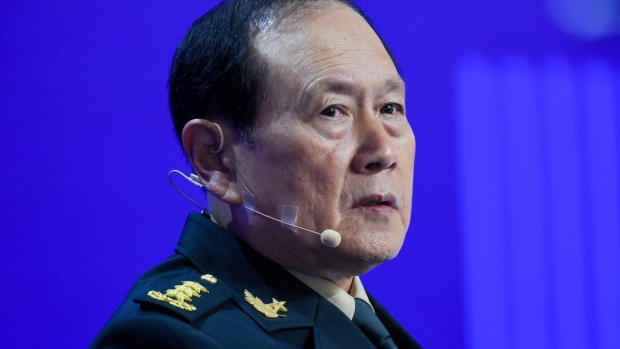Mar 11, 2023
China Names US-Sanctioned Aerospace Expert as Defense Minister
, Bloomberg News

(Bloomberg) -- China has named a general sanctioned by the US to be its new defense minister, setting up a potentially awkward encounter if he’s ever paired up with US Defense Secretary Lloyd Austin for a meeting.
General Li Shangfu is set to become Minister of National Defense and State Councilor — China’s equivalent of a cabinet member — according to a list of names nominated at the National People’s Congress in Beijing on Sunday.
The 65-year-old Li replaces outgoing defense chief Wei Fenghe, whose retirement was expected after he stepped down from the Central Military Commission at the Communist Party’s congress in October. Li joined the commission at the same session, becoming the first soldier on the body from the army’s Strategic Support Force, the branch created in a 2015 restructuring to focus on space, cyber, political and electronic warfare.
The move could spell more difficulties ahead for US-China ties — already strained over the shoot-down of an alleged Chinese spy balloon last month and tensions over Taiwan. In early February, Beijing rebuffed a US effort to arrange a call to address the balloon episode, and on Feb. 28 the Pentagon said top US and Chinese defense officials haven’t spoken since November.
US-China Downward Spiral Raises Fresh Fears of Eventual Conflict
Li was targeted by Washington in 2018 for violating US sanctions by allegedly aiding in the transfer of Su-35 combat aircraft and S-400 missile system equipment from Russian arms seller Rosoboronexport to China. At the time, Li was the director of the Equipment Development Department at the top military commission overseeing Chinese defense technology.
The US State Department leveled the wide-ranging sanctions at Russian entities, Li and his department in order to “impose costs on Russia in response to its interference in the United States election process, its unacceptable behavior in eastern Ukraine, and other malign activities,” according to a statement.
The restrictions imposed on Li included a prohibition on foreign exchange transactions under US jurisdiction, a prohibition on transactions with the US financial system, blocking of all property within the US, and a visa ban.
His ascension to the country’s top defense post also signals Beijing’s growing emphasis on aerospace defense technology. After graduating from the National University of Defense Technology, Li held posts at the Xichang Satellite Launch Center, where he oversaw the launch of China’s first lunar probe. During his time there, China also successfully launched its first anti-satellite missile.
Li also has previous experience working with Zhang Youxia, current vice-chair of China’s top military body and a family friend of President Xi Jinping. Li worked as the chief of staff and then deputy director at the General Armaments Department between 2013 and 2015, when Zhang was the director.
Li took over from Zhang and appeared at a civil-military fusion forum in 2017 as the head of the Equipment Development Department, after serving as the inaugural chief of staff and deputy commander of the army’s Strategic Support Force in 2016.
Xi Rewards Combat-Ready China Generals Amid Taiwan Tensions
During a debate on the government’s work report delivered at the National People’s Congress last week, Li reiterated the need to improve integrated national strategies and capabilities — a reference to the much-scrutinized civil-military fusion effort bringing together companies and the armed forces.
The military should “carry out military-diplomacy work with a focus on serving the big picture of political diplomacy,” Li said on March 6.
China’s annual parliament session kicked off March 5 in Beijing and will end on Monday. Late last week, NPC members officially gave Xi a norm-busting third term as president.
©2023 Bloomberg L.P.





